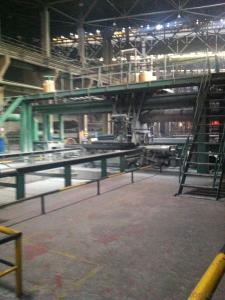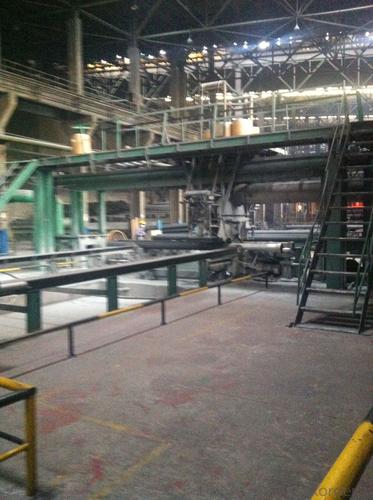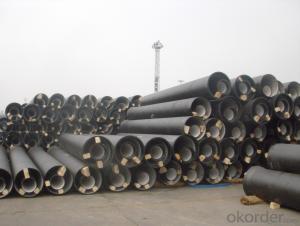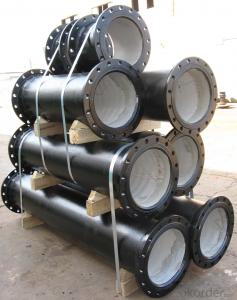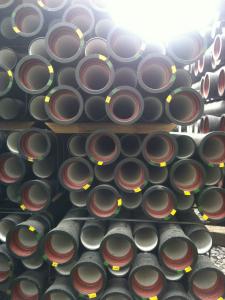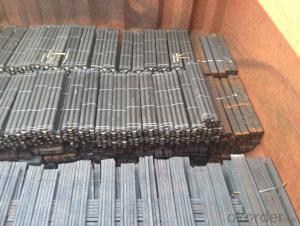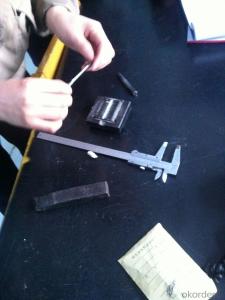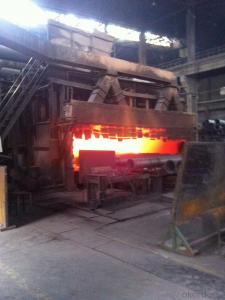DUCTILE IRON PIPE AND PIPE FITTINGS K8 CLASS DN500
- Loading Port:
- Tianjin
- Payment Terms:
- TT OR LC
- Min Order Qty:
- 23 pc
- Supply Capability:
- 3000 pc/month
OKorder Service Pledge
OKorder Financial Service
You Might Also Like
· Material : Ductile Cast Iron
· Size Range : DN 80mm to DN 2000mm
· Unit Effective Length : 6m or 5.7m
· Manufacture Standard: ISO 2531:1998/ EN 545:2006/EN 598:2007
· Annual capacity : 200,000 tons
· Coating Exterior: Zinc 130g/m2 according to ISO 8179-1 and bitumen coating 70 microns.
· Cement Interior: Portland Cement/ High Alumina Cement/ Sulphate Resisting Cement Lining according to ISO 4179
· Special requirements on external coating and internal lining can be applied
· We also provide accessories such as SBR/EPDM rubber gaskets, lubricant paste, pipe caps, PE sleeves, etc.
Additional Parts:
Each pipe is strictly inspected according to related standard to ensure permanently high performance.
Easy Installation at site and service free for life
Long Service Lifespan
Quotation will arrive you within 24hours once we get your inquiry.
We guarantee offering you a competitive price.
A copy of original inspection reports of pipes will be offered after shipment.
Photos of loading process will be sent to the customer after shipment effect.
We will follow-up the delivery progress after shipment effect and update to the customer on weekly basis.
- Q: Can ductile iron pipes be used for underground fire hydrant systems?
- Indeed, underground fire hydrant systems can utilize ductile iron pipes. Renowned for their robustness and endurance, ductile iron pipes are well-suited for subterranean usage. They exhibit remarkable resistance against corrosion and possess the ability to endure significant pressures, both of which are indispensable prerequisites for fire hydrant systems. Moreover, ductile iron pipes boast an extended lifespan, diminishing the necessity for frequent replacements and upkeep, thereby rendering them a financially prudent option for fire hydrant systems.
- Q: What is the composition of ductile iron pipes?
- Ductile iron pipes consist mainly of iron, with small amounts of carbon, silicon, and other alloying elements. The iron content typically ranges from 90% to 94%, while carbon content is usually around 3% to 4%. Silicon is added between 1.5% to 3%, which enhances the ductility and strength of the iron. Smaller quantities of manganese, sulfur, and phosphorus may also be present. The composition of ductile iron pipes is carefully engineered to achieve specific properties. By adding carbon and silicon, the hardness and strength of the iron are improved, making it suitable for demanding applications. These alloying elements also contribute to the pipes' ductility, allowing them to be easily bent and molded without breaking. In summary, the composition of ductile iron pipes is designed to strike a balance between strength, ductility, and resistance to corrosion. This makes them ideal for use in water and sewage systems, where they can endure high pressure, bear heavy loads, and resist the corrosive effects of water and other chemicals.
- Q: Can ductile iron pipe be used for water treatment plant applications?
- Yes, ductile iron pipe can be used for water treatment plant applications. Ductile iron pipe is known for its durability, strength, and corrosion resistance, making it suitable for transporting and distributing treated water within a water treatment plant.
- Q: How can 4 inch ductile iron pipe be connected with 2 inch galvanized pipe?
- Ductile cast iron used for more than 18 by adding nodulizer, after centrifugal ductile cast iron machine high speed centrifugal cast pipe, called "ductile" (Ductile Cast Iron Pipes), referred to as ball pipe, ductile iron pipe and ductile iron pipe etc.. The utility model is mainly used for conveying water, and is an ideal choice for tap water pipes.
- Q: Are ductile iron pipes resistant to microbiologically induced corrosion?
- Yes, ductile iron pipes are generally resistant to microbiologically induced corrosion (MIC). Ductile iron is a type of cast iron that has been treated with magnesium to give it increased strength and flexibility. This treatment creates a protective layer on the surface of the iron, making it less susceptible to corrosion caused by microorganisms. MIC occurs when certain types of bacteria, fungi, or other microorganisms interact with the metal surface of pipes and produce corrosive byproducts. However, ductile iron is generally resistant to MIC because the protective layer formed during the manufacturing process acts as a barrier, preventing microorganisms from directly contacting the metal surface. Additionally, ductile iron pipes are often lined with cement mortar or other protective coatings, which further enhance their resistance to corrosion. These linings provide an additional layer of protection against microorganisms, reducing the potential for MIC. Despite these inherent resistance properties, it is important to note that the resistance to MIC can vary depending on the specific conditions and environment in which the pipes are installed. Factors such as water quality, temperature, and the presence of certain microorganisms can influence the susceptibility of ductile iron pipes to MIC. Therefore, it is essential to consider these factors and take appropriate measures to prevent MIC, such as regular monitoring of water quality, proper maintenance, and the use of corrosion inhibitors or biocides when necessary.
- Q: How does ductile iron pipe perform in areas with high groundwater levels?
- Ductile iron pipe performs well in areas with high groundwater levels. Its durable and corrosion-resistant properties make it suitable for such environments. The pipe's strength and flexibility allow it to withstand the pressure exerted by the groundwater and adapt to any ground movement without compromising its structural integrity. Additionally, ductile iron pipe's protective linings further enhance its resistance to corrosion, ensuring long-term performance in high groundwater areas.
- Q: Can ductile iron pipes be used in acidic environments?
- Yes, ductile iron pipes can be used in acidic environments. Ductile iron pipes have a high resistance to corrosion, making them suitable for various applications including acidic environments. The high carbon content in ductile iron pipes creates a protective layer on the surface of the pipe, preventing the acid from directly attacking the iron. Additionally, the inner lining of the pipe can be coated with epoxy or other protective materials to further enhance its resistance to corrosion in acidic conditions. However, it is important to consider the specific concentration and type of acid present in the environment, as certain acids may still cause corrosion over time. Consulting with experts or manufacturers is recommended to ensure appropriate material selection for specific acidic environments.
- Q: Are ductile iron pipes suitable for underground applications?
- Yes, ductile iron pipes are suitable for underground applications. They are known for their durability, strength, and resistance to corrosion, making them ideal for use in underground environments where they may be exposed to moisture and soil conditions. Additionally, ductile iron pipes have a long lifespan and can withstand heavy loads, making them a reliable choice for underground applications such as water and sewage systems.
- Q: Can centrifugal cast iron pipe be galvanized or coated with asphalt which is good for corrosion prevention?
- By spraying zinc and epoxy coal tar coating of ductile iron pipe wall (or epoxy resin paint, polyurethane, etc.) wall using Portland cement (or epoxy powder, epoxy, polyurethane, ceramics etc.) wall coating can effectively active substances in soil and the formation of an insoluble zinc salt protection tube, the internal coating can inhibit corrosion of pipe body fluid medium.
- Q: How does ductile iron pipe handle ground movement and settlement?
- Ductile iron pipe is known for its excellent ability to handle ground movement and settlement. Due to its inherent strength and flexibility, it can withstand significant ground shifts without experiencing major damage or failure. One of the key features of ductile iron pipe is its high tensile strength, which allows it to withstand external forces and pressures. This strength enables the pipe to resist the effects of ground movement, such as soil settlement, subsidence, or shifting due to seismic activity. Moreover, ductile iron pipe has inherent flexibility, which allows it to absorb and distribute stress caused by ground movement. The pipe's flexibility helps to minimize the impact of settlement by allowing it to adjust and adapt to changes in the surrounding soil. This characteristic helps prevent the pipe from cracking, breaking, or leaking when the ground shifts or settles. Additionally, ductile iron pipes are often installed with flexible joints, such as push-on or mechanical joints, which further enhance their ability to accommodate ground movement. These joints provide a degree of flexibility and movement, allowing the pipe to adjust to changes in the soil without experiencing stress concentrations or structural failure. Furthermore, ductile iron pipe is highly resistant to corrosion, which is another important factor in its ability to handle ground movement and settlement. Corrosion can weaken pipes and make them more susceptible to damage during ground shifts. However, the corrosion-resistant properties of ductile iron help maintain the pipe's structural integrity and durability, even in challenging soil conditions. In summary, ductile iron pipe is well-suited to handle ground movement and settlement due to its high tensile strength, flexibility, and corrosion resistance. These properties allow the pipe to withstand external forces and adapt to changes in the surrounding soil, minimizing the risk of damage, leaks, or failure.
Send your message to us
DUCTILE IRON PIPE AND PIPE FITTINGS K8 CLASS DN500
- Loading Port:
- Tianjin
- Payment Terms:
- TT OR LC
- Min Order Qty:
- 23 pc
- Supply Capability:
- 3000 pc/month
OKorder Service Pledge
OKorder Financial Service
Similar products
Hot products
Hot Searches
Related keywords
